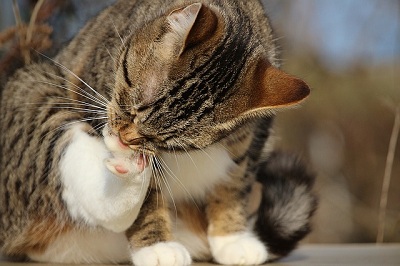Excessive Chewing and Licking in Cats
Excessive Chewing and Licking in Cats
Cats spend the most of their waking time grooming themselves. Many of us get the impression that cats chew and lick themselves all the time. For that reason, we have difficulty distinguish excessive chewing and licking habit from the normal one. According to feline experts, one-third of their time cats dedicate to cat-grooming habit. However, if a cat spends more time than experts suggest, then her grooming habit becomes compulsive. Many owners usually notice a problem when it gets obvious. Sometimes, they spot a patch or patches on cat’s fur, thin and ragged hair, or skin redness. In this phase, we should visit a vet. The veterinarian will suggest therapy, according to an underlying cause. Often, they can diagnose the problem by the location of the injured area. For many other cases, they will treat a sick animal, but they need further tests to find out what has caused the disease. Frequently, the underlying cause is fleas, even though we have not spotted the one. Veterinarians usually find flea eggs around the cat’s tail that point at the presence of fleas. In other cases, the reason is not that simple. Some cats develop excessive chewing and licking habit because of boredom. Boredom for an indoor cat can pave the way to depression. In this term, experts suggest two playing sessions with a cat during a day. Outdoor cats cope better with boredom, but indoor cats need a more interesting environment that will stimulate them to explore and play. To find out more about excessive chewing and licking in cats, the article “Excessive Grooming in Cats” gives us the following explanation.
Excessive Chewing and Licking in Cats
When all medical causes have been ruled out or resolved and you’ve narrowed the problem down to an issue of obsessive behavioral licking, treatment should be focused on stress reduction and environmental enrichment.
Cats like to eat at the same time every day, so make feeding time very consistent. Keep food bowls and litter boxes in a consistent location and, of course, very clean. Provide your cat with hiding boxes, access to high perches, and appropriate scratching surfaces.
Most kitties enjoy interacting with people, so take time every day to make sure your cat’s emotional needs are being met. You can involve physical activity with an interactive toy like a laser pointer. Brushing your kitty is beneficial for removing hair and cutting down on hairballs, and is quite enjoyable for many cats.
Consider investing in a treat or food-dispensing toy for your cat. You can also think about window perches or even kitty videos to help provide environmental enrichment.
You can talk to your holistic vet about stress remedies for anxious kitties. I’ve had success in treating these kitties with flower essences, homeopathics, and also acupuncture. Consider reducing stress with feline facial pheromone sprays such as Feliway.
Most importantly, you need to be patient, as excessive grooming problems usually take quite some time to resolve. But with consistent attention, affection, and routine, most kitties do get their psychogenic alopecia under control. They re-grow their hair, and their quality of life improves within a few months’ time.
The last option that can cause cats to chew and lick themselves excessively is stress. Even though we cannot immediately discover what has caused stress if we look at things from a cat perspective we will get a clearer picture. The arrival of a new baby, a new pet, or appearance of the intruder cat in the yard can cause a disturbance in the life of our furry friend. To help a cat get rid of excessive chewing and licking, we can take certain steps to make her more comfortable and less anxious.










